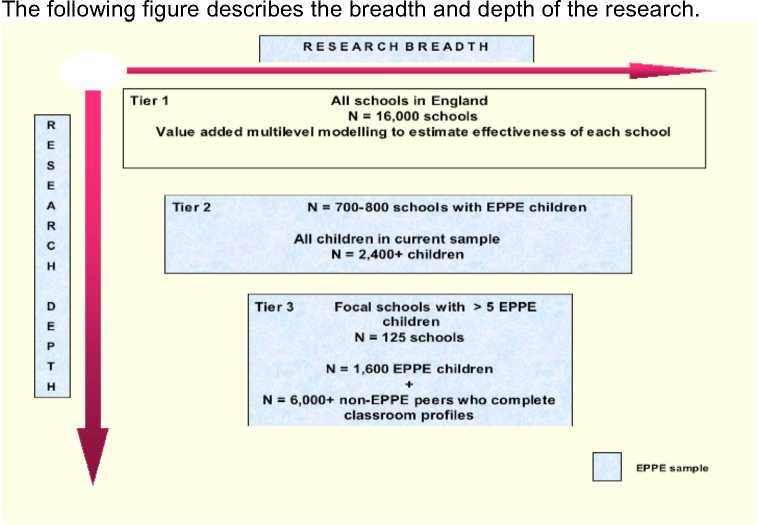Appendix C
Effective Pre-School and Primary Education 3-11 (EPPE-3-11)
Abstract:
The Effective Pre-School and Primary Education 3-11 (EPPE 3-11, 2003 - 2008) project will
continue to build on the extensive data collected in the original EPPE study, following the
children up to the age of 11 at the end of Key Stage 2. EPPE 3-11 is interested in the continuing
effects of pre-school education, the characteristics of effective primary schooling, the learning
trajectories of resilient and vulnerable children and the contribution to pupil progress of out of
school learning. This quantitative data will inform school observations which will document the
practices and processes at classroom level which influence children’s cognitive and
social/behavioural development. The study combines statistical analyses of pupil outcomes
(attainment, attitudes, SEN, etc.), observational and interview data on educational processes.
The main EPPE research officially ended in August 2003. The research findings have had
impact at national, LEA and practitioner level. EPPE has provided evidence for two Treasury
spending review rounds and has helped secure significant additional resources for early years
education and care. The roll out of the new Children’s Centre programme has been influenced
by the research findings. As EPPE have a unique sample of 3,000 children, with plotted
individual learning trajectories, the opportunity to use the sample to answer further research
questions presented itself. The Effective Pre-School and Primary Education 3-11 (EPPE 3-11)
Project is an extension to the main EPPE study and follows the same cohort of children to the
end of Key Stage 2. This five year extension has been developed to explore four related themes
in a series of embedded research tiers.
The four main research questions are:
1 Do the effects of pre-school continue through to Key Stage 2?
2 What are the characteristics of ‘effective’ primary classrooms and schools?
3 Who are the resilient and the vulnerable children in the EPPE sample?
4 What is the contribution of ‘out-of-school learning’ (homes, communities, internet) to
children’s development?

Tier 1 - Primary School Effectiveness study
The aim of the first tier is to compare the effectiveness (and trends in effectiveness) across Key
Stage 2 of all primary schools in England. This study will provide effectiveness measures for the
schools in the EPPE sample and allow us to place the schools EPPE children attend in the
context of all other schools in England. This study will constitute the first major multilevel value
added study of the effectiveness of primary schools in England.
84
More intriguing information
1. The name is absent2. L'organisation en réseau comme forme « indéterminée »
3. Quality practices, priorities and performance: an international study
4. Constrained School Choice
5. Optimal Tax Policy when Firms are Internationally Mobile
6. The name is absent
7. The name is absent
8. Developments and Development Directions of Electronic Trade Platforms in US and European Agri-Food Markets: Impact on Sector Organization
9. Pursuit of Competitive Advantages for Entrepreneurship: Development of Enterprise as a Learning Organization. International and Russian Experience
10. The name is absent